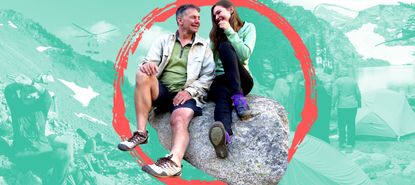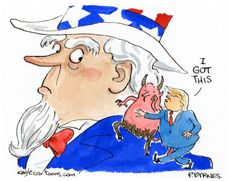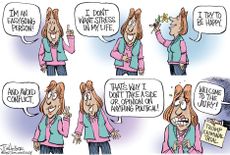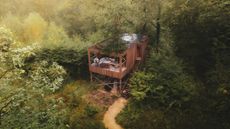The absolute joy of being miserable with my dad
My dad had a horrible idea of what constitutes 'fun.' We still always had a blast.


My dad insists that there are three levels of fun. He got this idea from a National Geographic speaker he heard a few years ago, but it always seemed to me to be a way to retroactively justify dragging my brother and me on some of the worst vacations possible, like the time we went to Lake Wenachee and I got over 100 mosquito bites because the air was so thick with bugs that even DEET didn't deter them.
My dad's version of the scale goes something like this:
Level one: You do something fun, and afterwards you can smile and nod and say to each other "that was fun!" Pretty straight-forward! I like to think of this as the kind of fun you have during a day at the park. You play some frisbee, eat a few hot dogs, and go home without stitches. In other words, it's what any sane, right-minded person would hope for out of an excursion with their father.
Subscribe to The Week
Escape your echo chamber. Get the facts behind the news, plus analysis from multiple perspectives.

Sign up for The Week's Free Newsletters
From our morning news briefing to a weekly Good News Newsletter, get the best of The Week delivered directly to your inbox.
From our morning news briefing to a weekly Good News Newsletter, get the best of The Week delivered directly to your inbox.
Level two starts to get more difficult to explain. The idea is basically that you do something and it's kind of terrible in the moment, but later you look back and go, "oh yeah, that was fun." This is basically white water rafting. You clamber into a small rubber raft with a guide who looks suspiciously no older than 12, you bounce past some pointy-looking rocks, but in the end you never actually fall out of the boat, no matter how much you feared you might along the way. Afterwards, you get to sit around the campsite and talk bravely about how much "fun" you had even though you know it's a tiny bit of a lie.
Now, the third level of fun is something of a specialty for my dad. In this level, you go out, you do something and are miserable the entire time, and afterwards all you can think about is how terrible it was. My go-to example of this is "that time our sailboat caught fire in the middle of Puget Sound." Actually, a lot of my level-three fun has happened on my dad's boat, like "that time our sailboat grounded on a sandbar and we had to wait for the tide to come back in only to then sail directly into an enormous storm," and "that time our boat's engine stopped working while we were going through a narrow channel and my dad had to start an emergency siphon by sucking on a diesel hose."
I can hear you now: What part of this, exactly, is "fun?"
The author E.B. White was a man who understood level three fun instinctually, long before there was a name for it. One of my favorites of his stories, "Once More to the Lake," starts with the narrator recalling a 1904 trip to Maine with his father in which "we all got ringworm from some kittens and had to rub Pond's Extract on our arms and legs night and morning, and my father rolled over in a canoe with all his clothes on; but outside of that the vacation was a success and from then on none of us ever thought there was any place in the world like that lake in Maine." That's the funny thing about this kind of fun; all you might be able to talk about is how bad the trip was, but somehow it still seems in your heart like it was the best thing in the world.
Sign up for Today's Best Articles in your inbox
A free daily email with the biggest news stories of the day – and the best features from TheWeek.com
Culturally, we tend to let dads off the hook pretty easy; they can do the bare minimum (not get you killed) and still get praised just for showing up. Level three fun isn't that, though; it takes a special kind of person to make a "bad trip" into something you feel strangely protective of when you look back on it. My dad and I might have been tired and cranky, injured or sucking diesel fuel through a hose, but we were together for the experience. Just him being there made our misadventures okay.
What White is getting at with "Once More to the Lake," too, is that long after you forget about the day at the park and the white water rafting trip goes fuzzy in your mind, you'll be able to recount in perfect detail the time you were backpacking and Cathy broke her ankle and had to be airlifted off the side of the mountain (yes, that happened on a trip with my dad, too). Science backs this up: In interviews, researchers have found that people tend to have a "preponderance of unpleasant memories," even if they "rated their childhoods as having been relatively pleasant and happy," The New York Times reports.
I think that's key — that despite all the "unpleasant memories," I was happy. Now the events have crystallized to become a sort of secret language for those of us who were there, the way war buddies might share a private understanding.
Dad, after all, never let the threat of a trip escalating into level three fun hold me or my brother back from an experience. It was on those semi-disastrous sailing trips that I also discovered my love of the ocean, and learned that ships speak in a language of halyards chattering against masts and gargled slaps of water against the bow. It was in the midst of a bout of level three fun that, in the suffocating black of an ocean night, I saw a seal swim, illuminated by green bioluminescence, below the inky waves, as magical and unreal as a children's book illustration.
Then, a few years ago, my dad and I decided to finish the last leg of the Wonderland Trail, a nearly 100-mile backpacking trip around Mount Rainier that we'd knocked off in sporadic thirds over as many years. That season, our group had only been able to secure permits for late September, and the weather on the mountain had already started to turn.
The penultimate day of our trip involved a long drop back into a valley and, having not trained much prior to the hike, I was plagued by increasingly painful shin splints on the descent. By the time the trail bottomed out, I was fully in tears, every step an excruciating, white-hot flash of pain. To make matters worse, it had started to snow, and then to sleet.
When our lean-to for the night finally became visible through the fog, my dad took my pack and carried it with his own for the last quarter mile. As I limped along, I mentally cycled through blaming myself for not putting in the work to avert an injury and lashing out at my dad for yet another one of his dumb vacation ideas. Why couldn't we go on cruises like a normal family? What's so wrong with a day at the park?
To anyone who wasn't there, it might sound like we'd made a grand misjudgment. My fingers were so cold I could barely bend them; we still had a painful number of tasks, from collecting water to preparing food, before we could rest; I wouldn't be able to do more than hobble for the next week.
But because I was there, I also know what it looks like when the brush on the hills turns ocher and maroon in an early alpine autumn. I know how the first snow in the high mountains makes everything appear as if you're seeing it through a dusty pane of glass. I know how low snow clouds slough off a glacier to blanket a meadow, muffling the nearby rivers and streams.
And I know, when I ask my dad about that trip, he will remember these things too.
Create an account with the same email registered to your subscription to unlock access.
Jeva Lange was the executive editor at TheWeek.com. She formerly served as The Week's deputy editor and culture critic. She is also a contributor to Screen Slate, and her writing has appeared in The New York Daily News, The Awl, Vice, and Gothamist, among other publications. Jeva lives in New York City. Follow her on Twitter.
-
 Today's political cartoons - April 21, 2024
Today's political cartoons - April 21, 2024Cartoons Sunday's cartoons - devilish decrees, biblical blunders, and more
By The Week US Published
-
 5 carefully selected cartoons about the Trump-Daniels jury selection process
5 carefully selected cartoons about the Trump-Daniels jury selection processCartoons Artists take on a stress-free life, rare peers, and more
By The Week US Published
-
 Loire Valley Lodges review: sleep, feast and revive in treetop luxury
Loire Valley Lodges review: sleep, feast and revive in treetop luxuryThe Week Recommends Forest hideaway offers chance to relax and reset in Michelin key-winning comfort
By Julia O'Driscoll, The Week UK Published